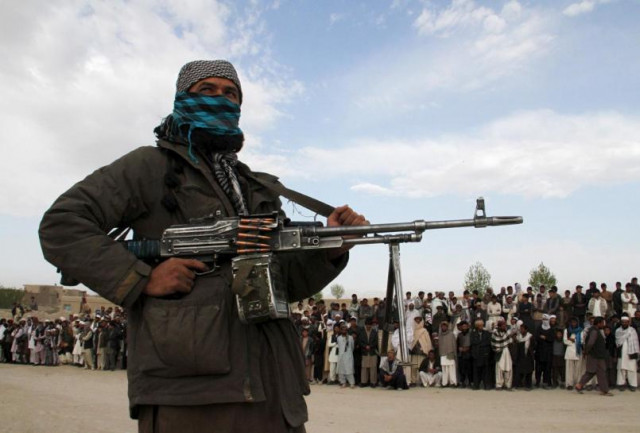Are Afghan Taliban invincible?
Trump administration’s heavy military strategy to weaken Taliban before any peace talks is doomed already

A member of the Taliban insurgent and other people stand at the site during the execution of three men in Ghazni Province April 18, 2015. PHOTO: REUTERS
Even more startling is the latest BBC survey and the quarterly report by the US Special Inspector General for Afghanistan Reconstruction. Both studies have illustrated that how insurgents slowly but surely stretching their influence in large parts of Afghanistan. The British state-run broadcaster in its assessment, based on the ground situation, has concluded that the Taliban are now openly active in 70% of Afghanistan, a stark reality that both the Afghan government and the Trump Administration would not want to face. The inroads the Taliban have made since 2014 were also spectacular given the fact that they achieved all this success mostly in post-Mullah Omar period. Since their spiritual leader’s death, there had been assessments that the Taliban might split. Also his successor could not survive long after US eliminated Mullah Mansur in a drone strike in Balochistan. Yet, the Taliban during this troubled period expanded their influence even beyond their traditional southern stronghold into eastern, western and northern parts of the country.
For the United States and Afghanistan, the critical factor behind the Taliban’s success in battlefield is Pakistan’s alleged support to the insurgents. No wonder the recent string of terrorist attacks in Kabul prompted the Afghan government to point a finger at Pakistan. The Afghan spy chief claimed that Pakistan was handed ‘undeniable evidence’ showing that attacks were planned on its soil. Pakistan said it would look into those details shared by Afghanistan.
Pakistan’s purported support to the Afghan Taliban and the Haqqani network may be a factor but can never be the major reason behind the Taliban’s rapid advances. It is a legitimate question to ask as to why would insurgents need a Pakistani space when they are now present in 70% of Afghanistan. The Taliban might have needed Pakistan’s support and its space soon after they were dislodged from power after the US invasion of Afghanistan in the wake of 9/11 attacks in 2001. But not anymore.
The key factor that both Afghanistan and the US seldom dwell on is the public support for the Taliban movement. Without popular support, the Afghan Taliban could not have sustained the 17-year-long US military might and have now become nearly invincible. Many terrorist attacks the Taliban carried out on the government installations had often been linked to the inside job.
Why the Taliban enjoy mass support despite their violent campaign? To understand this paradox, I recently got a chance to interact with a few Afghans, who live in a refugee facility in Haripur. Many of them I spoke to often travel to Afghanistan and their assessment was that a majority of Afghans feel more secure and safe in Taliban-controlled areas. The Taliban are also popular among non-Pakhtuns. For example, Abdul Wahab is a Turkmen Afghan but he finds the Taliban better than the “corrupt Afghan government.” Ehsanullah, another refugee, while endorsing Wahab’s stance said the fact that the Taliban gained upper hand simply because the Afghan government, backed by the US, failed to offer an alternative that could satisfy a large segment of the Afghan society.
In short, common Afghans have little faith in the beleaguered government in Kabul, something that allowed the Taliban to gain a foothold in the war-torn country. Bitter it may sound, many Afghans also view the US as an occupying force and part of the problem and not the solution. Finally, the Trump administration’s heavy military strategy to weaken the Taliban before any peace talks is doomed already as insurgents are powerful than ever before!
Published in The Express Tribune, February 5th, 2018.
Like Opinion & Editorial on Facebook, follow @ETOpEd on Twitter to receive all updates on all our daily pieces.















COMMENTS
Comments are moderated and generally will be posted if they are on-topic and not abusive.
For more information, please see our Comments FAQ